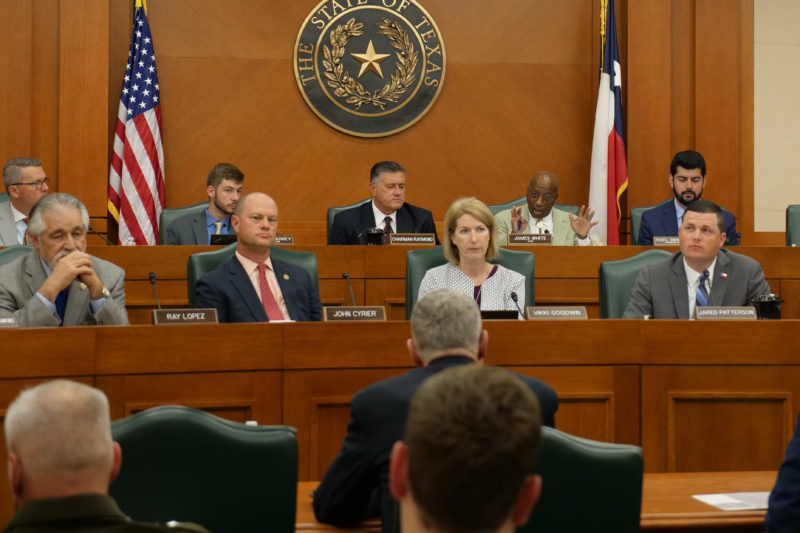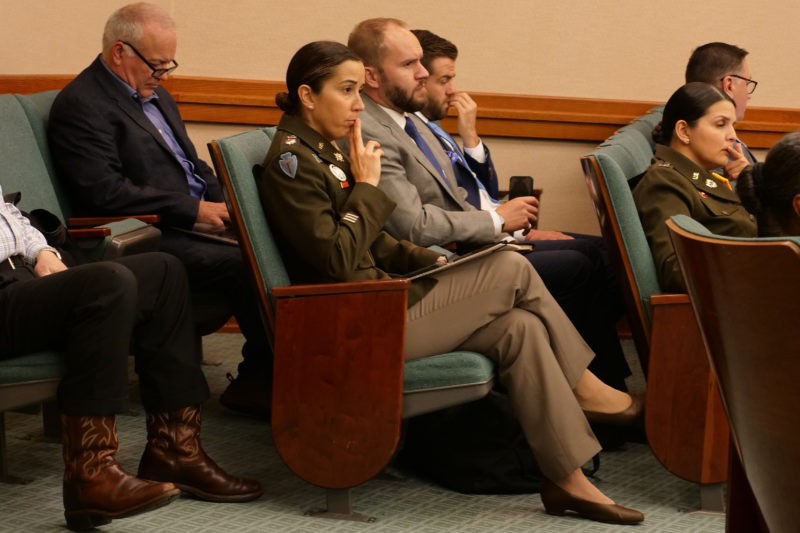Lawmakers Press National Guard Leaders after Soldier’s Death
By Jill Ament
Reporting Texas

Texas lawmakers conduct a hearing at the Capitol on April 27, 2022, as they investigate the death of a Texas National Guardsman who drowned while trying to rescue a migrant. Laura Ullman/Reporting Texas
Texas lawmakers grilled the top brass in charge of the state’s border security operation Wednesday following the death of a National Guardsman who drowned trying to save migrants in the Rio Grande.
Spc. Bishop Evans, a 22-year-old from Arlington, went missing Friday at a border crossing near Eagle Pass, after he attempted to rescue two migrants who appeared to be drowning in the river. His body was found Monday.
Some lawmakers want to know why Evans, who has been posthumously promoted to sergeant, didn’t have a floatation device assigned to him when he attempted the water rescue.
“Is it a part of the process to issue a life vest or floatation device to every National Guard soldier manning the border,” state Rep. Eddie Morales, D-Eagle Pass), asked Maj. Gen. Thomas Suelzer, military leader of Operation Lone Star, at Wednesday’s hearing of the House Committee on Homeland Security and Veterans Affairs.
“It is not, no,” Suelzer replied.
“And why is that?” Morales pressed.
“Typically, someone that is expected to work on a land site is not supposed to go into the water,” Suelzer said.
Suelzer said the troops have a little less than 200 buoy rope bags with 90 foot ropes for water rescues. Operation Lone Star leaders say floatation devices are located at every border security checkpoint. Marine divisions have a little more than 40 floatation devices assigned to them.
Deputy Adjutant General Monie R. Ulis, who oversees Texas National Guard forces, says he believes these numbers are sufficient for troops on the border.
“I am confident that one flotation device at the security point is sufficient given the number of occasions where we’ve had service members actually attempt to assist migrants, absolutely,” Ullis said. “We could buy 6,000 floating devices, but I think that would be a waste of government money. Because not all 6,000 are even in or near the water.”

Obervers listen as lawmakers conduct a hearing at the Capitol about the death of a National Guardsman who drowned while trying to rescue a migrant. Laura Ullman/Reporting Texas
Despite large portions of the Texas-Mexico border being located along the Rio Grande, Suelzer said standard water rescue protocol for most state National Guard troops deployed with Operation Lone Star is to not go into the water if they see migrants struggling to get across.
“We don’t have a formal protocol, to the best of my knowledge, that weighs when someone should jump in or not. If you’re not trained to be a boat crewman, you’re not supposed to be getting into the water,” Suelzer said. “(Evans) was not a boat crewman. Sgt. Evans was a human being. He saw a human being drowning and he jumped in the water to save him.”
Morales said he was aware that 15 to 20 water rescues take place each month on the Texas-Mexico border. Ulis said the number of rescues is lower and most occur when soldiers are assisting migrants who’ve already reached the riverbank.
Operation Lone Star is part of the state’s multi-billion dollar border security mission initiated last spring under the orders of Gov. Greg Abbott. The border mission is a joint operation of the Texas Department of Public Safety and the Texas National Guard. Evans’ comes as the border operation is also under scrutiny over issues of morale and solider suicides, pay discrepancies and a lack of work for soldiers to do.
At Wednesday’s hearing, House lawmakers also discussed the Biden administration’s plans to dissolve Title 42, the Trump-era immigration order allowing border officials to expel migrants seeking asylum at the U.S.-Mexico border because of health concerns due to COVID-19. A federal court has temporarily blocked Biden’s attempt to end the program.
The head of the Texas Department of Public Safety, Steve McCraw, said he doesn’t think Title 42 should end right now because it could lead to a significant increase in migrants crossing the Texas-Mexico border.
Border leaders also told lawmakers that they are addressing pay and morale issues for Texas National Guard troops deployed in Operation Lone Star, claiming that’s improving. They’re also asking the state allocate $530 million more dollars for their operations in the next year.